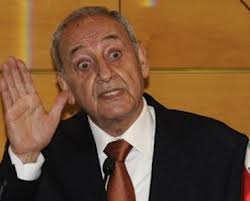 During a televised speech marking the 35th anniversary of the disappearance of the founder of the Amal Movement, Imam Musa al-Sadr , Lebanon Speaker Nabih Berri proposed Saturday an initiative to end the ongoing political crisis in Lebanon entailing all-party talks to address some of the country’s thorniest issues.
During a televised speech marking the 35th anniversary of the disappearance of the founder of the Amal Movement, Imam Musa al-Sadr , Lebanon Speaker Nabih Berri proposed Saturday an initiative to end the ongoing political crisis in Lebanon entailing all-party talks to address some of the country’s thorniest issues.
“We propose to president Michel Suleiman a roadmap to get us out of the current situation and it includes immediately taking part in a five-day dialogue sessions, in which PM-designate Salam must participate. In dialogue we would discuss the cabinet’s Policy Statement and supporting the army and controlling the border with Syria amid the spread of weapons.” Berri , who is also Amal’s current leader said.
He stressed that dialogue is the only way out of the Lebanese crisis:
“There is no way out of the Lebanese crisis except through Dialogue … we call on all parties to engage in an open Dialogue,” said Berri
The agenda of the talks would include in addition to the makeup and ministerial statement of the upcoming government, a revival of the discussions on a new electoral law, steps to support the military and the national defense strategy, according to Berri’s proposal.
Berri also said the talks should enable the Army to recruit 5,000 additional soldiers.
The outgoing Lebanese government collapsed last March and Salam has not been able to form a new government. The March 14 alliance has been insisting on a neutral, non-partisan government, a demand that the Hezbollah -led March 8 alliance has flatly rejected.
The political crisis gripping the country comes amid growing security concerns linked to the conflict in neighboring Syria.
Commenting on the crisis next door, Berri likened the events in Syria to the Palestinian “Nakba,” when countless Palestinians were forced to flee their homes prior to the formation of the Israeli state in 1948.
“The current situation in Syria is equivalent to the Palestinian Nakba [catastrophe] and we are facing the same Nakba but at a different place and time,” he said.
He also opposed any foreign intervention in Syria, amid the increasing likelihood of U.S.-military action against the regime of President Bashar Assad.
Berri warned that Lebanon will be the most affected by a war waged on Syria.”
“We strongly call for the withdrawal of Lebanese and Arab fighters from Syria and for ending the regional and international intervention in Syrian affairs,” the speaker who is strongly allied with Hezbollah said
He said that Israel would be the primary beneficiary of a possible strike against Syria and called for finding a political solution to the Syrian conflict.
“The solution for the Syrian crisis can only be achieved through negotiations. The use of force will lead nowhere and Israel is the only beneficiary in this case.” He said.
“The loyalists to the Syrian regime and the opposition, should accept to go to dialogue under Geneva II to restore the historic role of Syria,” he added.
Berri said a breakthrough in Syria “does not only require an inter-Syrian consensus but will need to be backed by a Russian-American agreement and a Saudi-Iranian understanding on regional affairs.”
Musa al-Sadr
Berri criticized the Libyans over the disappearance of the Shiite cleric.
“We were surprised by the hesitation of Libyan authorities to investigate al-Sadr’s case. We are still waiting to know the conclusion reached by the Libyan authorities and judicial system.”
He added: “We stress that Amal Movement was supportive of the Libyan revolution since the first day of its eruption and even after the regime collapsed and its leader were detained, its secrets have not yet been released.”
Addressing the Libyan revolutionaries he said: “This case will not be over and freedom should distinguish you from the former regime. Lebanon is still waiting for clear answers through questioning the criminals of the former regime.”
The Iranian-born cleric has not been seen since he went missing on a 1978 visit to Libya as a guest of Muammar al-Qaddafi. He and two companions are widely believed to have been murdered on the orders of the Libyan leader, either for political motives or as a result of a theological dispute that got out of hand.

Leave a Reply
You must be logged in to post a comment.